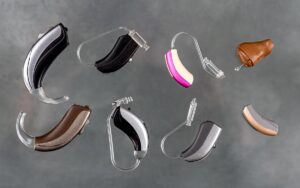We usually only notice technology the most when it stops working. With hearing aids that’s especially true: To most people who use them, hearing aids are more than just a piece of technology; they’re a crucial lifeline to the rest of society.
So identifying solutions for a malfunctioning hearing aid, and finding those solutions as quickly as possible, is important for both physiological and emotional reasons. Troubleshooting can be a difficult, risky process whether you’ve been wearing them for a week, a year, or decades. But there are some fairly easy measures you can try to get your hearing aid working correctly again.
Preventing Trouble Before it Occurs
Any advanced piece of technology requires maintenance, and hearing aids are no exception. Despite the fact that the casing may look simple and robust, the electronics inside can be extremely sophisticated.
So this means maintenance is a must. There are a few simple ways you can make sure that your hearing aid is taken care of as you’re using them.
Keep Your Hearing Aids Clean
Your ears normally and naturally make a certain amount of wax every day. And, the ear wax is, to a certain extent helpful for your ears. But it’s not so great for your hearing aids. Keeping your hearing aids clean and clear of wax buildup can help the longevity of the devices. The fact is that most hearing aids will come with a built-in wax filter that should also be cleaned periodically.
Moisture is The Enemy of Hearing Aids
Moisture and electronics don’t mix well. The effectiveness of your hearing aids can be compromised, despite the best protection technology available, if it is repeatedly exposed to moisture.
This Means using your hearing aids in the shower or while swimming is not a good idea. Additionally, if your hearing aids do become wet, dry them with a towel; heat from a hairdryer, for instance, can damage your hearing aids.
Make an Appointment With Professional Cleaners
Hearing aids need specialized cleaning as they are delicate, expensive technology. A specialized cleaner can better accomplish certain things that you can’t, even if you’re fairly thorough about your cleaning habits.
Every 4-6 months is the suggested time between cleanings.
How to Diagnose Existing Issues
Protective steps are essential if your hearing aids are currently functioning properly. You’re probably more interested in quick fixes if your having problems with your hearing aids not working anymore.
Try one of the following steps if your hearing aids aren’t working properly:
- Check your own ears. Sound from your hearing aid could be blocked by earwax buildup.
- Change the settings or toggle between programs. How you respond will depend on the model because each one is different in this way.
- Look for corrosion or loose wiring in the battery compartment. If you discover corrosion, you can attempt to carefully clean it away, but significant damage will have to be repaired professionally.
- Change out your battery or power source, even if your batteries are rechargeable.
- Adjust the volume. Sometimes you can do this via a remote or manually with the wheel on the hearing aid. Try both if you have the option with your hearing aid.
- Turn your hearing aid of then back on. This will correct the problem in some cases.
- Inspect your hearing aid for wax or debris accumulate. Gently wipe away any debris or wax you may discover.
- Look over your hearing aids for blemishes, cracks or other obvious signs of damage. Your hearing aid might need to be repaired if you notice any of this type of damage.
It’s likely that you will have to have the device fixed professionally if you want it back to peak condition if none of these tips work.
What if Nothing I Try Helps?
When your hearing aids aren’t working well anymore and troubleshooting has not addressed the problem, you will most likely have two options: either send the hearing aids in for service or buy a new pair of hearing aids. Which option works best for you will vary depending on your situation, how old your hearing aids are, and other factors.
Take the time to troubleshoot your hearing aids if they aren’t working correctly. A conversation with your hearing professional to determine a solution is the next step if that doesn’t work. To find a solution make your appointment right away.





